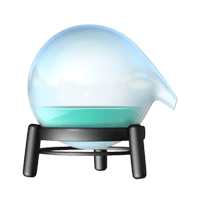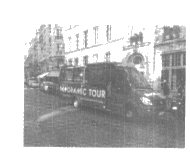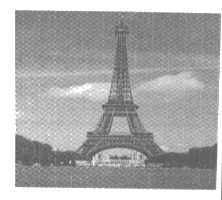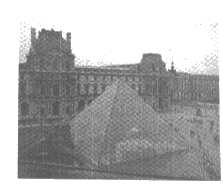本试卷共五道大题,39道小题。满分60分。考试时间90分钟。
知识运用(共14分)
一、单项填空(共6分,每小题0. 5分)
从下面各题所给的A、B、C、D四个选项中,选择可以填入空白处的最佳选项。
1. Mr. Lee likes reading and _________ favorite book is The Adventures of Tom Sawyer.
A. her B. his C. their D. your
2. —Sam, what do you often do _________ the science club?
—We do many interesting experiments.
A. of B. in C. to D. on
3. Hurry up, _________ we will miss the game.
A. and B. but C. or D. so
4. —Mom, must I clean my room now?
—No, you _________. You can do it after dinner.
A. needn’t B. mustn’t C. shouldn’t D. can’t
5. — _________ do you visit your grandparents?
—Once a week. We usually have a big dinner together.
A. How long B. How far C. How often D. How much
6. The _________ you climb, the more you can see.
A. high B. higher C. highest D. higher than
7. Betty’s family _________ to New York if her father gets a job there.
A. moves B. will move C. moved D. has moved
8. —What do you think of the movie Black Beauty?
—Fantastic. I _________ it twice.
A. watch B. was watching C. am watching D. have watched
9. Amy is a volunteer and she _________ with the waste sorting at school every Friday.
A. helps B. helped C. will help D. is helping
10. —Peter, please be quiet. Your brother _________ on the phone.
—No problem.
A. records B. recorded C. was recording D. is recording
11. A monkey escaped from the zoo last month. But several days later, it _________.
A. catches B. caught C. is caught D. was caught
12. A friend is someone _________ you know well and like spending time with.
A. who B. where C. which D. when
二、完形填空(共8分,每小题1分)
阅读下面的短文,掌握其大意,然后从短文后各题所给的A、 B、 C、D四个选项中,选择最佳选项。
Graduation Ceremony (毕业典礼)
Cindy and Daniel were waiting for their turn to go across the stage(舞台). No, it wasn’t the talent show. It was for graduation! They were both so nervous, and it was hard to think about anything except the huge stage.
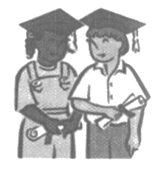
Daniel looked at his 13 and gave her a nervous smile. She held his hand tightly for comfort. In both of their minds, they 14 their turn walking across the stage, and they were both unknowingly thinking about the same thing: I’m going to trip and fall on the stage and everyone will laugh at me.
Cindy 15 his smile with her own uneven grin(笑容). Her hands were shaking. At least she didn’t have to give a speech like Sandra—that would have made it horrible. Daniel’s feet moved up and down nervously as the students were called one at a time to come up. Names were called and some special 16 were presented to the best students in art, music, PE, dance, math and science. Class by class, row by row, it was getting 17 to their turn. It was just minutes away, but time went by so quickly. Oh, no! It was their turn now.
Fearing it like a dentist’s visit, they both stood up with their class. They had to wait in line along the wall. Then, one at a time, the principal(校长) called their names. “Cindy Marie Godfrey, winner of a principal’s prize for great behavior and grades!” The audience cheered. Daniel 18 his friend step across the stage, stop to shake hands, get pictures done, and then exit on the opposite side.
“Daniel Adam Richmond, winner of a perfect attendance prize. ” Daniel stepped out 19 , hearing his shoes sound loudly on the wooden stage. He took a breath, and walked across the stage. The principal shook his hand, smiled, and then he was done.
Moments later, he 20 his friend offstage and they took a collective breath of relief(轻松)together. It was over and they had graduated. The little piece of paper proved it, and neither of them had fallen down!
13. A. friend B. teacher C. sister D. mother
14. A. missed B. liked C. imagined D. changed
15. A. covered B. returned C. compared D. mixed
16. A. reports B. prizes C. subjects D. programs
17. A. slower B. faster C. farther D. closer
18. A. watched B. heard C. helped D. made
19. A. noisily B. secretly C. carefully D. strangely
20. A. refused B. remembered C. recognized D. rejoined
阅读理解(共36分)
三、阅读下列短文,根据短文内容,从短文后各题所给的A、B、C、D四个选项中,选择最佳选项。(共26分,每小题2分)
A
Paris 4-Day Trip by Eurostar from London
If you’ve never visited Paris before, join us now! Reach Paris by Eurostar—the high-speed train. Enjoy a 4-day trip in a 3-star hotel with breakfast included, and see the sights around the city.
Day 1 Take the panoramic tour (全景之旅)—a tour of Paris by bus with fantastic views. The tour ends at our 3-star city hotel. After check-in and some time for food, you will meet the guide. In the evening, you will travel by subway to enjoy a boat tour.
|
Day 2 Enjoy a half-day trip to the Palace & Gardens of Versailles(凡尔赛)—£45. It is undoubtedly the most famous chateau(城堡) in France. This trip is fully guided. Price includes coach or train to Versailles, tour guide and entry to the Palace. The whole evening is yours to enjoy the Paris nightlife.
|
Day 3 On this day you’ll have some free time for your own sightseeing. The hotel is so centrally located that sightseeing on your own is very easy. Or, you can join the half-day trip to climb the Eiffel Tower and get a “bird’s eye view” of this wonderful city.
|
Day 4 Please get ready for a morning trip by subway to the Louvre Museum and your chance to see the Mona Lisa, Michelangelo’s Dying Slave and many other great works. After lunch and some last-minute shopping, our guided tour ends. You will be taken by bus back to the station, for the return to London.
|
21. What can visitors do on Day 1?
A. Climb the Eiffel Tower.
B. Do some last-minute shopping.
C. Take the panoramic tour of Paris.
D. Visit the Palace & Gardens of Versailles.
22. How do visitors go to the Louvre Museum?
A. By bus. B. By train. C. By boat. D. By subway.
23. This passage can probably be found in a(n) _________.
A. science book B. travel website
C. food magazine D. adventure novel
B
The Day the Lights Went Out
On a hot and wet summer day, Nura and her dad found a place to cool off at the city museum. Suddenly the lights blinked(闪烁) off and on. With a final pop, the lights went out completely, leaving the room black.
“Dad, what’s going on?” Nura called out loudly.
“I’m not sure, but we’ll wait and see if the lights come back on,” Dad said calmly. In a moment, a museum worker waved the flashlight (手电筒) at them and said, “There’s a power cut across the city, so we have to close the museum. I’ll walk you to the gate. ”
Nura and her dad stopped at their favorite shop for ice cream. When Nura’s dad tried to pay, the shop owner waved his hand. “Forget about it,” he said. “It will all be soup soon, anyway!”
After a long, hot walk, Nura and her dad arrived home to find some of their neighbors outside their flats. Everyone shared ice water, talking and laughing together about the heat.
“I can’t stand it in my room,” Mrs. Fong said, fanning herself with a newspaper. Another neighbor nodded. Nura recognized him as the man who lived in the flat above hers.
A woman who lived downstairs was standing in the doorway. “If the power doesn’t come on soon, I’ll have to throw all the food away. ” she said.
“I have some meat in the fridge, too,” said Nura’s dad. “It would be nice to use the grill(烧烤架) to cook before it goes bad. ”
“I’ll see what I have,” the woman in the doorway said. “I’ll make sure to bring enough for everyone. ”
That evening, Nura learned that the man from upstairs was named Sergey. The downstairs woman was Rachel.
As they finished their dinner, night fell over the city. For the first time in Nura’s life, their street became completely dark. Stars blinked overhead. She’d never seen such a sight.
The night air was thick and hot, but Nura didn’t mind anymore. She had enjoyed free ice cream, and she had shared a dinner with her neighbors. She smiled to herself and continued to watch the stars.
24. Nura and her dad had to leave the city museum because _________.
A. Nura fell down and got hurt
B. it was too hot inside the museum
C. there was a power cut across the city
D. their neighbors were waiting for them
25. What did Nura and her neighbors do that evening?
A. They shared a dinner together. B. They went to the city museum.
C. They ate their favorite ice cream. D. They read newspapers together.
26. How did Nura probably feel at that night?
A. Sad and lonely. B. Warm and pleased.
C. Nervous and surprised. D. Bored and disappointed.
C
Are you tired of making so many decisions every day? People may be faced with up to 35,000 choices and a huge number of options(可选择的事物)per day. When tired of decision making, people may depend on fate(命运)—roll a dice or simply flip a coin.
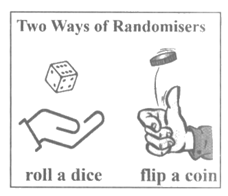
Shall we make choices at random(随机)? I came to think about the benefits of random decision making when watching a TV show last night. Its main character Sheldon used the dice to randomly order food and drinks in a restaurant. He did this to free up his mind to consider some more important problems. However, his friends question the method’s success. Indeed, this random restaurant order including a large drink was too much for him. Sheldon finally realized that the random result could be improved by reducing options to leave out large drinks. This example suggests that random decision making may not always work well and it’s necessary to reduce the options before rolling a dice in some situations.
In some unimportant decision situations, randomisers make it easier to decide. But how do dice work in more important decision situations? It’s hard to accept the idea of completely depending on a dice. However, this doesn’t mean that dice or coins can’t be of any help at all.
Let me borrow another example from Sheldon. He couldn’t make up his mind when choosing a new TV set from two. His friend Amy asked him to flip a coin. Rather than blindly following the result, however, she suggested checking his emotional reaction. Did he experience happiness or disappointment when faced with the coin’s result? Sheldon’s reaction could be useful to find out which one he truly preferred.
Recently, scientists studied this decision method and found that flipping a coin led people to imagine the two different results more clearly, which resulted in a stronger emotional reaction, and then they recognised hidden preferences and made decisions more easily.
A related study further proved that randomisers simplify the choice process. When using dice, people were less likely to look for additional but unnecessary information about the different options. This helped to speed up their choices.
Taken together, recent research shows surprising benefits of flipping coins and rolling dice as long as people don’t let the results control their choices. Using them but keeping the freedom to be different from the results can speed up the decision process and help solve decision problems.
27. The first example of Sheldon shows that random decision making _________.
A. is always effective
B. helps make a good order
C. may work better with fewer options
D. can offer more solutions to important problems
28. The writer probably agrees that _________.
A. people should not roll dice or flip coins in important situations
B. people will make better choices when experiencing happiness
C. dice can speed up decision process with unnecessary information
D. reaction to the result of the randomiser may show one’s true preference
29. Which of the following would be the best title for the passage?
A. Follow Your Heart or Your Head?
B. Should You Let the Dice Decide?
C. Listen to Friends, or Roll a Dice?
D. How Do You Make a Wise Decision?
D
Most of us feel younger or older than we really are. This “subjective age” is simply based on the way we feel inside. The number of years that have passed since you first entered the world is an unchangeable fact, but everyday experiences suggest that we often don’t experience ageing the same way.
Scientists find that “subjective age” is the key to understanding why some people appear to be energetic as they age—while others do not. What’s more, various studies have shown that your subjective age can predict important health outcomes. In some real ways, you really are only as old as you feel.
One interesting study has discovered the way our subjective age interacts with our personality. It is now well-accepted that people tend to become less open to new experiences while ageing. However, such personality changes are less pronounced in people with a younger heart and more noticeable in people with older subjective age. Moreover, people with younger subjective ages become more careful—good changes that come with normal ageing, thus making fewer mistakes. On the other hand, some studies suggest that feeling between 8 and 13 years older than your actual age results in an 18-25% greater risk of death and disease, while feeling younger means better physical health and less of a chance of being hospitalized. But the connection between health and subjective age almost certainly acts in both directions. If you feel upset and physically weak, you are likely to feel older. The result could be a vicious cycle(恶性循环). In this way, the effect of subjective age on health is comparable or stronger than that of actual age. With these in mind, many scientists are trying to discover reasons that may shape this process. When do we start to feel that our minds and bodies are operating on different timescales? And why does it happen?
One study found that most children and teenagers feel older than they really are. But this changes at around 26, when 70% would prefer to be younger. Some researchers argue that a lower subjective age is a form of self-defense, protecting us from negative age stereotypes(消极的年龄刻板印象) in different areas of life, such as work and health. Believing “I may be 65 but I only feel 50” would mean you are less worried about your performance at work, for example. This thinking helps people distance themselves from the society’s sad view of ageing and gives us a hopeful view of the future.
With these findings, it is possible that in the future, science might be able to reduce people’s subjective age and improve their health as a result. In the meantime, these findings can give us a clearer view of the way our own brains and bodies weather the passing of time. No matter how old you really are, it’s worth questioning whether any of those limitations are coming from within.
30. According to the passage, subjective age _________.
A. will not easily change when you get older
B. is simply based on how others think of you
C. refers to the number of years you have lived
D. results from your personal experience of ageing
31. What does the underlined word “pronounced” in Paragraph 3 probably mean?
A. Obvious. B. Important. C. Beneficial. D. Limited.
32. What can we learn from the passage?
A. People with higher subjective age are healthier.
B. More people will have higher subjective age after 26.
C. Actual age has a stronger effect on people’s health condition.
D. A lower subjective age may free us from the society’s sad view of ageing.
33. The writer believes that _________.
A. the age we feel is important to us
B. subjective age is too good to be true
C. future science will prevent us from getting old
D. there are many unknown areas hidden in our brains
四、阅读短文,根据短文内容回答问题。 (共10分,每小题2分)
One of the problems harming our planet is the number of things we throw away. Rubbish of all kinds is piling up in landfill and polluting our rivers and oceans. A more recent addition to the list of things we throw away is e-waste-electronic items(物品) that are broken and not recycled. Now solutions are being found to give this waste a new life.
Many millions of tons of televisions, phones, and other electronic products are thrown away each year, partly because it’s cheaper to replace them than to fix them, but also because we don’t have enough skills to repair them. A UN report says 50 million tons of e-waste is produced every year, and it will be more than double to 110 million tons by 2050. That makes it the fastest growing waste in the world.
However, repair events and clubs are getting popular nowadays. That could be part of a solution to the increasingly terrible e-waste problem. The BBC visited a Restart Project in London, which is one of many found around the world. One of its volunteers, Francesco Calo, said that “the purpose of the project is to reduce waste, and help people who cannot afford to repair them.”
As there are many valuable metals(金属) in electrical items, another idea is e-waste mining(矿). An experiment at the University of New South Wales involves taking these materials from electronic products. It’s thought that doing this could be more likely to make money than traditional mining. With phones typically having as many as 60 elements(成分), this could be part of the solution to our desire for new technology.
These projects make total sense-collections of e-waste for recycling are “decreasing” according to Ruediger Kuehr, of the United Nations University. And in countries with no related law, much of it just gets thrown away. However, if the government decides to be involved, there will be some effective methods to deal with e-waste. Take the European Union as an example. It is now trying to solve the problem by insisting companies have to make products longer-lasting and will have to supply spare parts for machines for up to 10 years.
34. What is e-waste?
35. How much e-waste is produced every year according to a UN report?
36. What’s the purpose of the Restart Project in London?
37. What can people take from electronic products by e-waste mining?
38. What’s the passage mainly about?
书面表达(共10分)
五、文段表达(10分)
39. 从下面两个题目中任选一题,根据中文和英文提示,完成一篇不少于50词的文段写作。文中已给出内容不计入总词数。所给提示词语仅供选用。请不要写出你的校名和姓名。
题目①
假如你是李华,你们学校的健身俱乐部要举办一场健身经验分享活动,你打算邀请你们班交换生Peter参加。请用英语写一封电子邮件,告诉他活动的时间和地点、活动安排,以及他需要做什么准备。
提示词语:fit,share,invite,experience,question
提示问题:●When and where will you have the activity?
●What will you do?
●What do you advise Peter to prepare for it?
Dear Peter, How is it going? There’ll be an activity on “How to Keep Fit ” in our school. _____________________ _____________________________________________________________________ _____________________________________________________________________ I’m looking forward to your early reply. Yours, Li Hua |
题目②
“自我悦纳“指个体能够正确评价和接受自己,并在此基础上不断改进、完善,取得更好的发展。它既是一种处世态度,也是一种处理困境的方式。
某英文网站正在开展以“Self-acceptance”为主题的征文活动。假如你是李华,请用英语写一篇短文投稿,分享一段你的经历。在这段经历中,你认识到自己的缺憾或不足,勇敢面对,积极改进,并最终取得进步,完善了自我。
提示词语:difficult,realize,accept, improve
提示问题:●What challenge have you ever met?
●What did you do to deal with it?
●What have you learnt from the experience?
__________________________________________________________________________
__________________________________________________________________________
__________________________________________________________________________
__________________________________________________________________________
__________________________________________________________________________
参考答案
知识运用
一、单项填空
1. B 2. B 3. C 4. A
5. C 6. B 7. B 8. D
9. A 10. D 11. D 12. A
二、完形填空
13. A 14. C 15. B 16. B
17. D 18. A 19. C 20. D
阅读理解
三、阅读短文,选择最佳选项。
21. C 22. D 23. B 24. C 25. A
26. B 27. C 28. D 29. B 30. D
31. A 32. D 33. A
四、阅读短文,回答问题。
34. E-waste is electronic items that are broken and not recycled.
35. 50 million tons of e-waste is produced every year.
36. To reduce waste, and help people who cannot afford to repair electronic items.
37. Valuable metals.
38. The problem of e-waste and the solutions.
书面表达
五、文段表达
题目①
Possible version
Dear Peter,
How is it going?
There’ll be an activity on “How to Keep Fit” in our school. I’d like to invite you to attend it.
This activity will be held at 6 o’clock this Friday evening in our school library. All the members of the Fitness Club will take part in it. First, some of our members will share their experiences of how they keep fit in their daily life, including their exercise plans, useful skills, their feelings as well as achievements they’ve made. Then, the free talk will start and everyone will be allowed to ask questions.
You’re welcome to share your own exercise experience. You can also share the details of your diet with us.
I’m looking forward to your early reply.
Yours,
Li hua
题目②
Possible version
When I was in Grade 4, I didn’t like being with my classmates. Instead, I preferred reading books alone.
When I heard my classmates call me “nerdy”, it hurt me a lot. I had many conversations with my parents and teachers. Then I came to realize that it was OK to be different and that I didn’t need to be like others. But I did try something new to fit in: I began to share what I read with my classmates. I even join their games sometimes, which has helped me make new friends.
We are all different. Although I should accept myself for who I am, I can also do something to improve, which will help me become a better and happier “ME”!
